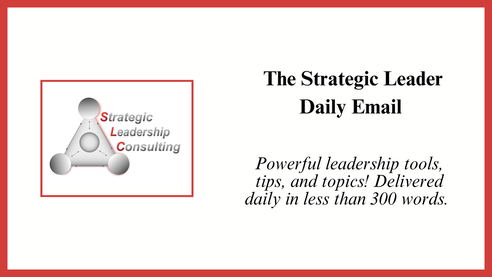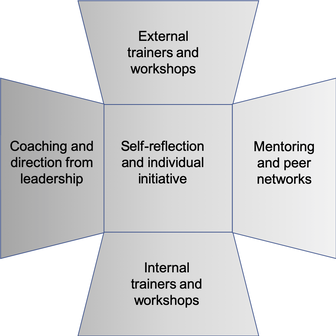|
Colleagues,
Today we continue the series on the fifteen most important things I have learned from others. Motivation equals value divided by effort. So, quite simply, if people don’t seem motivated enough then one of two things is wrong. Either they don’t see the full value, or the endeavor requires too much effort. This isn’t about being resistant, or lazy, or anything else negative. It is just economics. I may drive nine hours to visit my family, but I won’t travel that distance to visit someone I met at a party last week. The value is not worth the effort. Note also, that what some people may value highly, others may not. In addition, the same task may require different levels of effort by different people. A motivation problem is simply a misalignment between what we are asking people to do and the value they see in doing it. Do good and be well, Frederick
0 Comments
Colleagues,
Today we continue the series on the fifteen most important things I have learned from others. This builds on number one. Again, it is not our position to judge. When I was younger (not that long ago), I thought the world would be so much better if everyone thought just like me, so I bent my leadership skills towards trying to make people be like me. Thankfully, I had an incredible mentor who helped me to see my own arrogance, and to begin to understand what servant leadership was. Real leaders honor others by supporting them in their own journeys, not by trying to take others on the leader’s journey. Do good and be well, Frederick Colleagues,
In what is now an annual summer tradition, I share the most important things I’ve learned from other people. This summer we have 15 lessons. 1. Everyone deserves respect, period This is such a powerful belief for two reasons. First, it frees you of trying to judge people, which is a quite taxing and useless exercise that most of us engage in far too often. Respect people because they are people and don’t worry about trying to decide whether or not they deserve it – they are human beings, so the do. I’ll be away from email for a while, but please feel free to respond to this series and I will get back to you after my return. Do good and be well, Frederick Colleagues,
This week we’ve been looking at four big ideas:
If we put all of these things together, we can develop a plan for how to support each individual employee in our organization. It goes something like this:
I’m not sure if I have done justice to the process in these five posts (less than 1500 words), but I hope you have at least an understanding of what is possible. We could develop individual growth plans for each person and focus leadership on supporting those plans. At the end of the year, we should have an organization in which most people are 10-20% better. This is not easy, but it is possible. If improving organizational performance by 10-20 percent appeals to you, consider contacting me. I’m happy to take some time to learn about your situation and how I might be able to help you. Do good and be well, Frederick Colleagues, Today is the fourth of the four big ideas. On Friday we will put these ideas together. Big idea #4 There are five ways that we get better. These make up what I call the cube of development. We spent several days last July talking about four of the elements, building self-reflection, and a week’s worth of posts going into more depth here. As we think back to 9-box, each side of the cube works better for some boxes and less well for others. A table is included below. Take a few minutes to think about that table and reflect on specific individuals and their needs.
Do good and be well, Frederick |
Categories
All
Archives
July 2024
|



 RSS Feed
RSS Feed